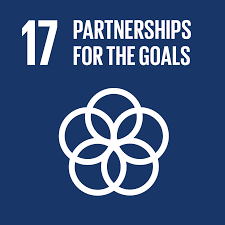
Blog
- View the official blog from The Gwenna Moss Centre for Teaching Effectiveness (GMCTL) at the University of Saskatchewan. This post helps instructors to identify ways in which they can infuse Goal 17 Partnerships for the Goals into their own courses. It provides learning outcomes, ways to reflect, share & act and curricular connections and questions for students related to Goal 17.
Case Studies
- The Urban Sustainability Exchange (USE) website has case studies specific to each Sustainable Development Goal. These provide information on programs, projects and policies being implemented in cities around the globe to accomplish Sustainable Development Goals.
- Visit the Global Environmental Education Partnership (GEEP) for the case studies. The GEEP was launched by the United States Environmental Protection Agency, the Taiwan Environmental Protection Administration, and the North American Association for Environmental Education (NAAEE). The GEEP developed a list of topics in environmental education to achieve the environmental protection goals in each country and address issues such as climate change through environmental education and citizen engagement.
Infographics
- View this infographic on SDG 17 by the UN’s Department of Economic and Social Affairs(UNDESA). This infographic illustrates an overview of global partnership for sustainable development, targets and indicators and progress reports. UNDESA acts as the Secretariat for the SDGs, providing substantive support and capacity-building for the goals and their related thematic issues, including water, energy, climate, oceans, urbanization, transport, science and technology, the Global Sustainable Development Report (GSDR), partnerships and Small Island Developing States.
- View this infographic and report on SDG 17 by the UN’s Department of Economic and Social Affairs(UNDESA). This document shares eye-opening statistics on the subjects related to global partnership such as global foreign direct investment, internet use and development assistant flows.
Lesson Plan
- SDG 17: Partnerships for the Goals - The Business Collaboration for Global Goals lesson is from the Gustavson School of Business at the University of Victoria in British Columbia. This lesson underscores the importance of revitalizing global partnerships to support sustainable development and addresses the role of businesses in achieving the SDGs.
- The following link will take you to a PDF with the direct link to multimedia educational resources, pedagogical resources and ideas for classroom activities and lesson plans for infusing SDG 17. View the PDF document here.
Video Library
- View the SDG Academy Library, a video library that consists of a vast collection of videos in the form of lectures. There is a series of lectures on different themes by Professors from around the world. Videos related to many different themes and issues under each sustainable development goal can be found in this library.
Websites
- View the World's Largest Lesson website which has many creative tools and resources for educators to promote learning about Sustainable Development goals. There are a variety of resources on the website that can be used to teach each SDG such as lesson plans, guides, videos, books, comics, games, quizzes, and many other resources. The resources are available in many different languages.
- View the website Springer Nature to access a collection of different resources related to SDG 17. There are interviews, books, journal chapters and articles, blogs, collections and special issues related to SDG 17.
- View the Makematic website with animated and live-action videos that focus on global learning for teachers and students. The website has 68 animated and live-action films dedicated to Sustainable Development Goals. There are videos exploring each SDG.
- View the SDG Tracker website to access data related to the progress of Goal 17, its related targets, and indicators. It is a free, open-access resource that tracks global progress toward the SDGs.
- View Canadian Indicators For Sustainable Development Goals for Canada-specific statistics and reports categorized by each SDG targets and indicators. The data is provided by Statistics Canada and presented in charts and tables.
Products
Ecochallenge.org Store provides a diverse range of resources and tools designed to inspire and empower individuals, communities, and organizations to take meaningful action toward sustainability. Offering customizable challenges, guides, and materials, the platform promotes habit formation and collective efforts to tackle global environmental and social challenges.
This initiative is strongly connected to the Sustainable Development Goals (SDGs), including Climate Action (SDG 13), Responsible Consumption and Production (SDG 12), and Partnerships for the Goals (SDG 17). Through interactive challenges and community-driven programs, the Ecochallenge.org Store fosters collaboration and education to drive sustainable change.
Ecochallenge.org Store provides tools and resources for sustainability challenges that encourage collective action and habit formation. Educators can utilize these challenges to integrate experiential learning into their curricula, teaching students about real-world sustainability practices and how to drive environmental and social change.
Fill It Forward is a sustainable and innovative initiative that encourages individuals and organizations to reduce single-use plastic waste by reusing their drinkware. By pairing physical products like reusable bottles with a digital platform, Fill It Forward tracks users’ positive environmental impact, fosters community engagement, and funds clean water and waste-reduction projects globally.
This initiative is deeply connected to the Sustainable Development Goals (SDGs), particularly Clean Water and Sanitation (SDG 6), Responsible Consumption and Production (SDG 12), and Partnerships for the Goals (SDG 17). Each use of a Fill It Forward product contributes to funding clean water initiatives, promotes sustainable habits, and builds a global community committed to reducing waste.
Fill It Forward encourages the reduction of single-use plastics through reusable drinkware paired with a digital app that tracks environmental impact. It fosters sustainability and funds clean water initiatives. Educators can incorporate this initiative into classroom discussions on sustainability, data analysis, and community impact while engaging students in tracking their contributions to global challenges.
